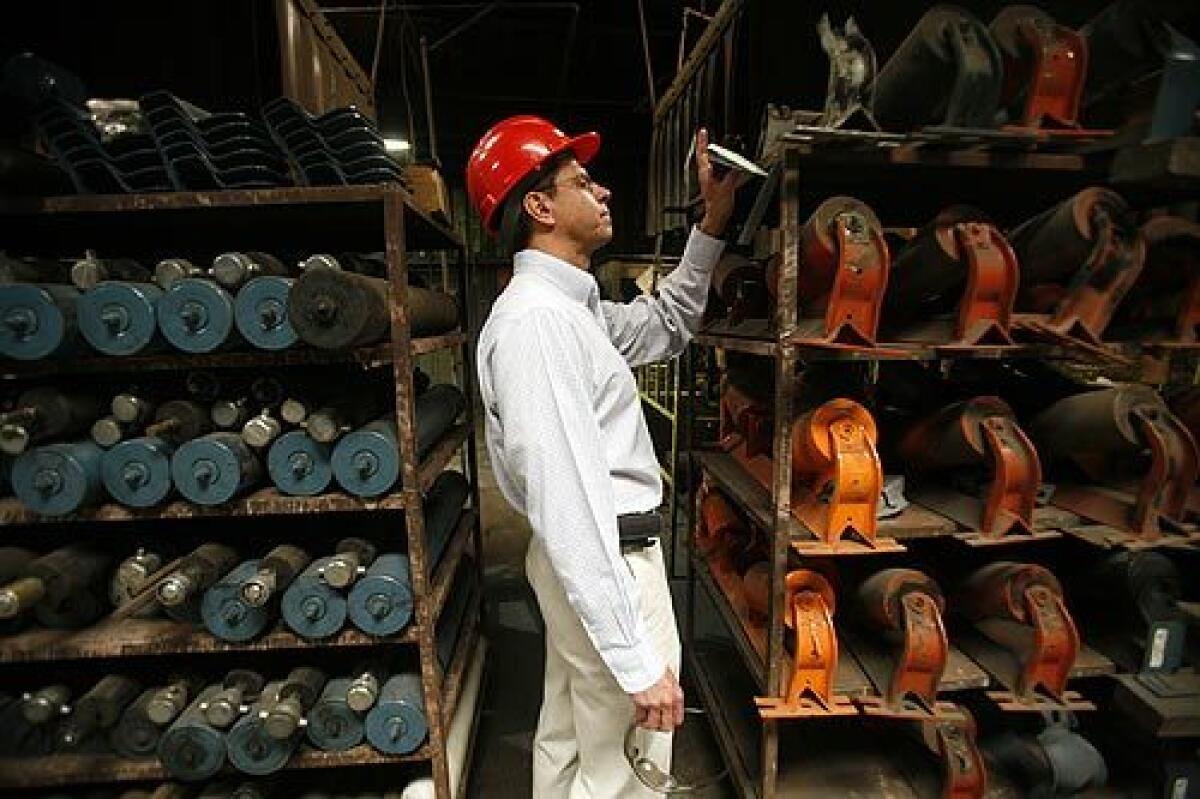Losses of factory jobs in California blamed on regulation

- Share via
The El Monte factory stopped operating just a few weeks ago, but already it feels abandoned, an appropriate setting for a “Terminator” movie.
The dusty clock on the wall is frozen at 7:00. Below it, the deep pits that once held molten steel are now empty, and the parts created there wait in hundreds of boxes to be shipped off across the country or turned into scrap.
FOR THE RECORD:
Factory closures: An article in Business on June 23 about a Milken Institute report blaming California’s regulations and high taxes for pushing businesses elsewhere said Gregg Industries closed its El Monte foundry under pressure from the South Coast Air Quality Management District to make $5 million in upgrades. The AQMD, which had not been contacted for the story, disputes the assertion, noting that in regulatory filings, Gregg’s parent company cited the “overall weak economy and the particularly difficult economic issues facing the foundry industry and manufacturing” for its decision. —
Two months ago, more than 300 people were employed at the site making engine parts for trucks and heavy machinery for Gregg Industries, which is owned by Neenah Enterprises Inc. in Wisconsin.
But a settlement with the South Coast Air Quality Management District required Gregg to spend $5 million on factory improvements, so the company decided instead to leave the state. Company spokesman Adan Ortega Jr. said Gregg didn’t want to make the payment in the difficult economic climate.
Gregg is part of the parade of companies marching out of California. The state lost 79,000 manufacturing jobs between 2003 and 2007, while seven other states with a meaningful percentage of U.S. manufacturing gained 62,000, according to a report scheduled to be released today by the Milken Institute.
The report blames the state’s onerous regulations and high taxes in particular for pushing businesses elsewhere.
“The picture is not pretty,” said Perry Wong, senior managing economist at the Milken Institute, which received funding from the California Manufacturing and Technology Assn. for the study.
The state is shedding manufacturing jobs at a faster pace than the nation as a whole, the report said. Though many jobs left the country in the 2002 recession, states such as Arizona, Nevada and Oregon saw an increase in manufacturing employment in 2003.
Part of the problem, Wong said, is that regulations change so often in California that it’s difficult for companies to plan. The state enacted an average of 15 changes in labor law each year from 1992 to 2002, four times more than state legislatures averaged nationwide.
California also often requires projects to be approved in many different jurisdictions, so that a plan vetted by the state could be sidetracked by the county, Wong said.
Not everybody agrees with the report’s conclusion. Christopher Thornberg of Beacon Economics said manufacturing output has been as high as ever in the state and that there’s no evidence that jobs are going to other states.
“At least up to the last couple of years, the pace of job loss in manufacturing in California was no different than anywhere else,” he said, basing his calculations on the state gross domestic product, the value of goods and services made in the state.
California GDP grew last year despite the global financial crisis, said Brian McGowan, the state’s deputy secretary for economic development and commerce. And green-energy jobs in the state have grown at a rate 10 times faster than total job growth since 2005. To evaluate a state’s business climate, he said, companies should focus on workforce skill, availability of capital and overall quality of life, rather than just on taxes and regulatory costs.
Still, Gregg Industries in large part blames the frustrating regulatory environment for its fate. Ortega said a few neighbors complained that the factory smelled, calling the AQMD hotline frequently. He said inspectors began to harass Gregg employees, citing the company for odor nuisances on days when machines weren’t even running.
“The agency here was accusatory and threatening,” Ortega said. “Workers lost their jobs because we couldn’t meet an arbitrary standard of nuisance odors.”
The Milken report also broke down the job losses by sectors. Cut-and-sew apparel manufacturing lost 45,000 jobs since 2000, the computer and electrical product industry cut 70,000 and the printing industry shed 23,500. The report calculates that if manufacturing had maintained its 12.8% share of employment in the state, nearly half a million jobs paying an average of $57,000 a year would have been preserved.
To prevent more departures, the study recommends creating incentives for innovation, assisting companies in obtaining capital, investing in workforce development and establishing an office to streamline the regulatory process.
Heftier incentives might have motivated SolarWorld, a manufacturer of solar technology founded in Camarillo, to keep more jobs in the state. It decided to consolidate its wafering and cell manufacturing in Oregon after that state offered incentives, such as property tax abatement and business energy tax credits, said Bob Beisner, a company vice president. SolarWorld will employ 1,000 in Oregon by 2011. It will also keep some jobs in California.
“The price of land in California was extraordinary, and the incentives that the state was willing to talk about were few,” he said.
The business community fears that the exodus might quicken with the implementation of more regulations, such as one that would cut warming emissions in the state to 1990 levels by 2020. The California Chamber of Commerce has labeled that law a job killer.
The state Assembly Committee on Jobs, the Economy and Economic Development plans to hold a hearing June 30 on the departure of manufacturing jobs. In April, Assemblyman Dan Logue (R-Marysville) brought 13 legislators to Nevada to talk to business owners who had been lured there from California.
“We have to stop the hemorrhaging,” he said. “We have to make California business-friendly again.”
More to Read
Inside the business of entertainment
The Wide Shot brings you news, analysis and insights on everything from streaming wars to production — and what it all means for the future.
You may occasionally receive promotional content from the Los Angeles Times.











